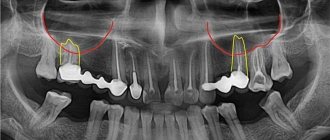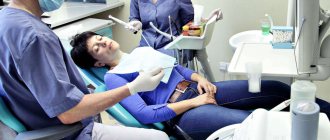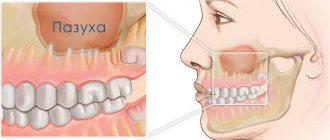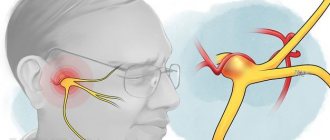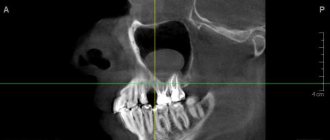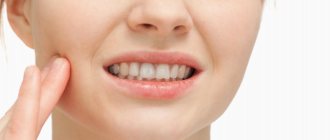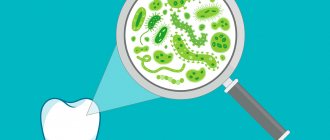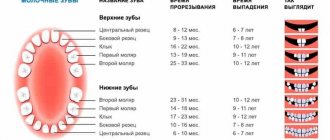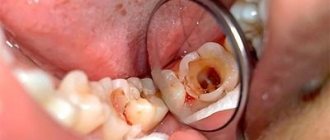Toothache during a cold: causes and treatment
One of the symptoms of a common cold, along with high fever, runny nose and cough, can be toothache. Teeth that are completely healthy at first glance can turn out to be a source of pain and signal problems with the body. When a toothache occurs due to a cold, adequate treatment prescribed by a general practitioner can quickly relieve you of this unpleasant symptom.
Why does toothache occur with a cold?
Toothache, along with headache and earache, can be a symptom of a cold. It occurs most often due to such a phenomenon as the occurrence of excess pressure in the nasal sinuses. When you have a cold, your sinuses become inflamed, and the mucus that forms in them blocks the passage, creating pressure that leads to pain. As soon as the inflammation of the mucous membrane is relieved, the teeth stop hurting. In addition, when we have a cold, we often drink a lot of liquids that contain acid. It can have a harmful effect on tooth enamel and cause pain. Also, when we have a runny nose, the mucous membrane of our mouth dries out quite noticeably, and the sugar that lingers on it in this way can also negatively affect the teeth.
Toothache due to a cold: treatment
So, we have looked at the main reasons why toothache most often occurs during a cold. Treatment prescribed by a therapist will help you recover as quickly as possible, and therefore get rid of painful sensations in your mouth. In the meantime, while the healing process is underway, you can relieve toothache using one of the proven home remedies.
- Rinsing with a baking soda solution (1 small spoon per glass of warm water) will help relieve inflammation and reduce irritation in the mouth. To achieve maximum effect, it is best to rinse your mouth 2-3 times an hour until signs of improvement appear.
- Dental drops. They can be purchased at any pharmacy for a small price. These drops have a calming effect and are based on camphor and valerian. It is enough to apply a few drops on a cotton swab and apply to the aching area.
- Sage decoction. Keep the warm sage decoction in your mouth for a few minutes, and you will notice that your toothache will become much less intense.
- Painkillers. If toothache causes you a lot of problems during a cold, then you can use any of the painkillers: ibuprofen, paracetamol, etc. The main thing is that the benefits of their use outweigh the harm they can cause to your liver and the entire body as a whole.
You can get a consultation at the DENTISTRY clinic. Make an appointment by calling +7 (8342) 308–088 or using the form below.
Make an appointment
The relationship between ENT organs and dental health
30.10.2017
Author: Dentist-periodontist Tamara Valerievna Kudzieva
Often, patients are faced with a situation where doctors have difficulty making a diagnosis due to the proximity of certain organs, and the patient is forced to turn to related specialists in order to avoid an inaccurate diagnosis.
Dental science is no exception. The diagnosis, etiology, i.e. is quite common. The cause of which dentists sometimes find it difficult to determine. Namely, inflammation of the maxillary (maxillary) sinus - sinusitis. Or a diagnosis whose name is more familiar - sinusitis. Patients are often confused about which doctor to see, a dentist or an ENT specialist.
Let's figure out why often an ENT doctor and a dentist cannot share this diagnosis.
First, let's give a definition and understand what the maxillary sinus is:
The maxillary sinus is a cavity formation in the upper jaw, lined with mucous membrane.
The function of the maxillary sinus is to warm and purify inhaled air. When an infection penetrates, one way or another, the mucous membrane of the sinus becomes inflamed, this process is called sinusitis (sinusitis). The patient usually complains of a feeling of nasal congestion, the presence of purulent exudate (discharged fluid), headaches, fever, pain in the projection of the sinus when tilting the head and palpation.
The reasons for the development of sinusitis can be odontogenic (due to the tooth) and non-odontogenic.
Non-odontogenic causes are most often associated with complications of colds or viral diseases, rhinitis. A specialist in ENT diseases works directly with this diagnosis.
We will dwell in more detail on the odontogenic cause of sinusitis:
As noted above, the cause of the development of this type of inflammation is an infected tooth.
This is due to the anatomical features of the structure of the upper jaw, since the roots of the teeth are located close to the sinus or even directly in it:
Thus, in the presence of a chronic inflammatory process in the canals of the teeth of the upper jaw, this infection spreads to the mucous membrane of the sinus, causing its inflammation. If there is an odontogenic cause for the development of sinusitis, it is not advisable to treat only the sinus by an ENT doctor, since this treatment will not give a long-term effect. It is necessary to eliminate the cause of inflammation - an infected tooth. And often, such unpleasant manipulations as punctures, rinsing, and prescribing antibacterial agents do not bring the desired result.
And therefore, competent ENT specialists, before starting treatment, must refer the patient to a dentist to exclude an odontogenic cause for the development of sinusitis.
If the inflammation is caused by a tooth, the dentist first needs to assess the feasibility of treating and preserving the tooth. If the prospect of treatment is assessed as favorable, then the endodontist performs high-quality root canal treatment to eliminate the infection. Before permanent filling of the canals, you may need to temporarily fill them with agents that have an antiseptic effect. And then, having seen the positive dynamics, seal the tooth hermetically. If the tooth is severely damaged, or there is no possibility of passage of the canals (sclerosis, severe curvature, root perforation, false passage, broken instrument), then such a tooth must be removed.
After eliminating the cause, after a couple of months, a control CT scan is performed to make sure that the sinus has begun to recover.
It is important to note that all sinuses communicate with each other; therefore, an infection from the maxillary sinus, in the absence of proper treatment, can spread throughout the entire sinus system, which greatly complicates treatment.
Thus, a competent approach to treatment and timely redirection to a suitable specialist will prevent an incorrect diagnosis and, as a result, incorrect treatment tactics. And therefore, save the patient’s time and finances.
Why is this happening?
The most common causes are the following factors:
- Presence of carious cavities. In this case, pain occurs when eating. Discomfort extends to the entire dentition.
- A cyst localized on the root of a tooth. When it reaches its maximum size, the neoplasm can compress the nerve endings, which is what causes this alarming sign.
- Inflammation of the pulp. In the presence of this dental disease, acute, unbearable radiating pain occurs. The problem is only in one tooth, but it feels like the entire dentition is bothering you.
- Enamel hyperesthesia. We are talking about increased sensitivity of units. When eating foods that are too hot, cold, sour or sweet, a person feels severe pain.
- Trinitarian neuralgia. The most common cause of this symptom. The pain is very piercing; there is a feeling that absolutely the entire lower part of the face, including all the teeth, is bothering.
There are also a number of pathological processes that are not dental. For example, we can talk about ear pain. Discomfort spreads to the jaw, the pain is throbbing and acute. Having eliminated the root cause (that is, inflammation in the ear), pain in the oral cavity will go away on its own; no separate treatment is required.
High fever and toothache control
Most dentists agree that when the body temperature is elevated, it is not advisable to deal with dental problems. The body already has a difficult time - it is fighting the virus, trying to destroy pathogenic microflora. Additional intervention may negatively affect the speed of recovery. Moreover, with a cold, any wounds that arise after medical manipulations heal more slowly. Consequently, the risk of secondary infection increases sharply.
But the situation is completely different if the temperature is not a symptom of ARVI, but a consequence of tooth inflammation. Here, waiting for a runny nose or cough to go away is unacceptable. You should visit a doctor as soon as possible. Even a tiny dental root cyst can cause problems that lead to partial edentulism.
How does dental sinusitis develop?
The paranasal sinuses (sinus paranasales) consist of a system of several cavities in the near-nasal space.
In the case of a cold, less ventilated sinuses are especially susceptible to developing sinusitis. The maxillary sinuses (sinus maxillaris, maxillary) are relatively well ventilated. However, the floor of the maxillary sinus is separated only by a narrow bony plate from the molars of the upper jaw. Due to this anatomy, the development of dental (odontogenic) sinusitis is quite common. The main cause of odontogenic sinusitis may be inflammation that forms in the area of the roots of the teeth and easily spreads to the mucous membrane of the maxillary sinus. Common pathogens include bacteria such as:
- Streptococcus pneumonia - streptococcus;
- Haemophilus influenza – hemophilus influenzae;
- Moraxella catarrhalis is a protobacterium of Moraxella.
Odontogenic maxillary sinusitis can also form due to tooth extraction (extraction). If one of the maxillary molars is removed, with damage to the bone grafting of the upper jaw, bacteria from the oral cavity can enter the sinus. In this case, they talk about the formation of an unnatural connection between the oral cavity and the paranasal sinus - an oroantral fistula. This trigger factor is considered one of the common causes of “dental” sinusitis.
A third dental cause of sinusitis involves inflamed roots that go unnoticed. As a result, cysts are formed that “grow” into the sinus cavity.
What to do if you had to postpone your visit to the doctor due to a viral disease
Doctors most often do not recommend self-medication at home. But, if there is a dental problem, and it will be possible to visit a specialist only after some time, the patient needs to take responsibility for his health.
Following a number of rules will help here:
- Put oral hygiene first. Use the brush and paste morning and evening. After each meal, rinsing with warm water or a special rinse is recommended.
- Drink plenty of fluids. This will reduce the symptoms of intoxication, which may be a consequence of viral disease and tooth inflammation.
- Take medications aimed at relieving ARVI symptoms. They usually contain painkillers and anti-inflammatory compounds that quickly relieve pain (including dental pain).
- Dissolve menthol tablets. They reduce discomfort in the throat and distract if only one is aching. Menthol provides a weak anesthetic effect, but is safe for health. The only thing is that the component cannot be used by people who are allergic to it.
- Make mouth baths with soda and salt. To prepare a medicinal solution, half a teaspoon of one of these compositions is dissolved in a glass of warm water. Take the liquid into your cheek (from the side of the painful tooth) and hold it for several minutes, then spit it out. Repeat the procedure several times in the morning, lunch and evening. Baking soda and salt perfectly relieve inflammation, destroy bacteria and “pull out” pus. It is very important that the water in which they are dissolved is warm and not hot.
- Avoid eating sweets, sour and spicy foods. When the enamel is thinned, such food aggravates the course of the disease.
- Don't chew anything hard. Nuts, candies, crackers - these and other hard goodies are prohibited until a doctor cures an oral disease.
- Chew food on the healthy side of the jaw. It is advisable to try to temporarily reduce the load on the “culprit of pain”.
As soon as your health returns to normal, you should immediately go to the dentist. Then the doctor will safely treat the affected unit.
Take care of yourself and do not develop dental diseases. Visit your dentist annually, even if you don't have a toothache or notice any new cavities. Regular examinations are the best preventative measure.
Acute and chronic odontogenic sinusitis
This form of sinusitis is quite painful. This occurs due to the connection between the acute form and inflammation in the area of the tooth root. However, if there are always persistent dental problems, acute sinusitis can develop into chronic inflammation of the antral sinus. The two forms of sinusitis differ in their symptoms.
Acute dental sinusitis manifests itself:
- Severe throbbing pain;
- Swelling around the cheek (can reach up to the eyelid);
- Redness of the nasal wall and turbinates;
- Secretion from the nose is mucopurulent in nature.
In addition, pressing on the affected area may cause pain. Acute dental sinusitis is usually accompanied by fever.
Signs of the chronic form of odontogenic sinusitis are often much less pronounced. Some patients experience symptoms only occasionally, such as occasional headaches.
How coronavirus affects oral health
Scientists and dentists around the world have come to the conclusion that coronavirus affects teeth as destructively as it affects the circulatory system. Poor blood circulation leads to the fact that the jaw structures do not receive additional nutrients - dental tissues begin to deteriorate, the gums become inflamed and bleed.
[3] We must not forget that when treating Covid-19, large-scale antibiotic therapy and various antiviral drugs are prescribed. This explains why teeth hurt after Covid. Taking antibiotics can cause candidiasis (fungal infection) of the oral cavity. This will further worsen the condition of periodontal tissues (especially if the patient already has periodontal disease), which can lead to loosening and loss of teeth.
Another reason that teeth hurt after coronavirus is the inability to carry out high-quality oral hygiene if the patient was on a ventilator. This leads to the accumulation of a huge amount of bacteria and toxins on the surface of the enamel and gums. The waste products of pathogenic microorganisms trigger an inflammatory process, periodontal pockets form, gums hurt, teeth become mobile, and bone tissue is destroyed.
Is it possible to visit the dentist if you have a cold on your lips?
Cold sores or Herpes is a common viral disease. Before visiting the dentist, you should find out whether it is possible to treat your teeth if you have a cold on your lips. Dentists do not perform dental treatment if they find herpes on the lips. This is explained by the fact that the virus from the lips can enter the oral cavity during treatment. And this can lead to another dental disease – stomatitis. It should be noted that even under sterile conditions in the dental office, the herpes virus can continue to exist, and there is a high risk of infecting the next patient at the appointment. Proper treatment of colds on the lips takes only a few days, so it is better to postpone a visit to the dentist during treatment.
From all of the above it follows:
- In most cases, it is better to postpone dental treatment for a cold.
- Treatment is possible only in emergency cases.
- To reduce toothache during a cold, you can use various remedies. By choosing the most suitable ones, you will be able to make this period easier.
- If immediately before your appointment with the dentist you have a cold on your lips, then without hesitation, you need to reschedule the date of your visit.
Take care of your health and be healthy!
